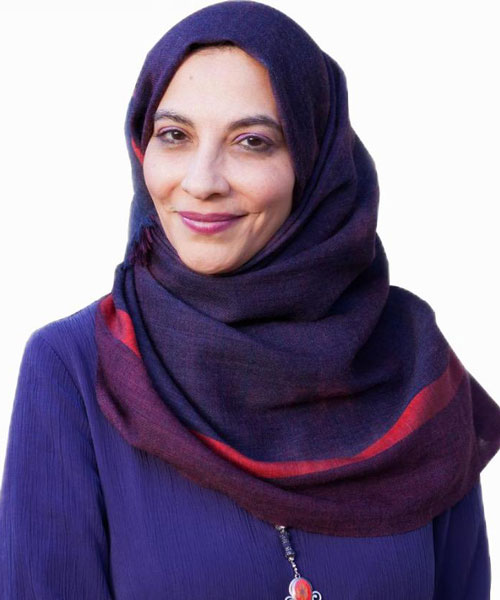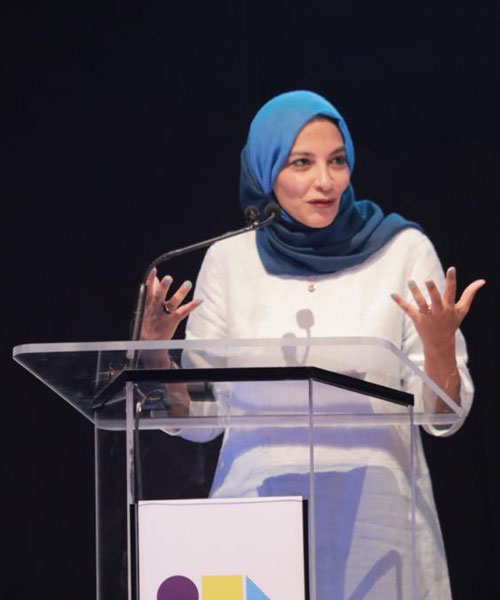Each crisis reveals new paths to development, and COVID-19 is no exception. After the initial confusion and emergency measures, countries worldwide began reorganizing their social systems, education structures and everyday lives. While this unexpected pandemic was unfolding, the international community agreed on the importance of sharing scientific knowledge and working together to achieve common benefits. Now Open Science, innovation and interdisciplinary collaborations are rapidly becoming key factors that will influence global decisions.
Hayat Sindi, a Saudi Arabian medical scientist, is an influential voice from the Arab world, whose opinions are internationally valued. She was the first Saudi woman to be accepted at Cambridge University where she earned a PhD from Newnham College (2001) and was a visiting scholar at Harvard University. Through the years, she gained international recognition: in 2012, she was appointed by UNESCO Director-General as a UNESCO Goodwill Ambassador, and in 2013 she was invited to serve in Saudi Arabia's Consultative Council. Today, she is Senior Advisor to His Excellency Bandar M.H. Hajjar, President of the Islamic Development Bank (IsDB), and the Global Ambassador for the Health and Development Partnership with the G20.
In this interview with TWAS staff writer Cristina Serra, Sindi offers her view on how to get the most out of the COVID-19 emergency. (The interview has been slightly edited for clarity).
We are living in unprecedented times due to the COVID-19 pandemic, which has taken many by surprise. After months of efforts, and with signs of improvement, there are still many questions with no answer. Is there a particular lesson we should learn from this experience?
Nations worldwide had different priorities before COVID-19. Now the whole world is realizing that we need innovation, science and technology to survive. Now, more so than in the past, policymakers, governments and institutions are changing their priorities, rethinking how they can use creativity, science and technology to allow conversations, e-learning and all the other activities we need to carry out from home. Certainly, now more than ever we need innovation in every aspect of our lives: scientific, financial, social innovation. But, in parallel, we need to invest more in science and technology.
In the COVID-19 era, the concept of Open Science has become central to many institutions, including UNESCO. Is Open Science a tool that could reinforce, or even create scientific cooperation at the global level?
Absolutely! We all have different skills and cope with different situations in different ways, but we are all facing the same future. Therefore, we must realize that we can learn from each other, transfer knowledge and collaborate. Along with Open Science, we also need to consider Open Innovation, these concepts are similar, in that they both assume broad and active engagement and participation in the innovation process. Therefore, we need to couple Open Science and Open Innovation to catalyse actionable knowledge in service of the Sustainable Development Goals (SDGs), with particular focus on the Least Developed Countries (LDCs).
Could you provide an example?
At IsDB, we have established an amazing Transform Fund, and we have a category that looks to sponsor any innovative ideas that fall under capacity building. Through the lens of capacity building, in different countries, we look at educational systems, health, food security, renewable energy, water, infrastructure and industries. Through IsDB’s partnership with TWAS, we also have a programme to help member countries build their capacity in research, expertise and training. At the moment we are working with two major labs from two different countries to join their workforces. We have identified two African research groups, from Nigeria and Benin, that work on the same topic, water and hygiene, and we are supporting and promoting their collaboration. Their labs have different capacities and resources, but from their collaboration, we see there is technology transfer. Collaboration can influence and impact several areas — involving women, young entrepreneurs, professors, and crossing any type of barrier, nationality, status and experience. They are now building something for local common benefits. Open Science has tremendous power: it encourages multidisciplinary and social innovation. For both Open Science and Open Innovation to be a beneficial tool, we need to have joint programmes between G20 countries and LDCs, to improve collaborative capacity building. Therefore, we must enhance the preconditions for Open Science and Open Innovation. This can be done through support for SDG4, which includes literacy and lifelong learning, as well as SDG9, which includes infrastructure for internet connectivity and access to digital networks. We should also ensure open access to existing scientific and technological information, and flexible intellectual property rules that do not discourage users from contributing to projects and that allow fair use of their services.
Where in particular does COVID-19 call for transnational cooperation?
As you said, regarding this virus there are still many questions with no answer. To address this pandemic, we need to produce knowledge in immunization, pharmacology, engineering, synthesis chemistry, physics, maths and drug design if we want to achieve clinical and health goals. All of that is a huge opportunity for Open Science and collaborative work. With TWAS, we are working in this direction. We have launched two joint programmes: one is a technology transfer grant [https://bit.ly/3byOTH9] aimed at receiving innovative proposals to tackle challenges posed by COVID-19; the other is a postdoctoral fellowship programme [https://bit.ly/2Wwaewx] for building skills in sustainable science, based on attaining the 17 SDGs. Both these initiatives are targeted at promising young researchers from IsDB Member Countries, including from the 21 IsDB Least Developed Member Countries (LDMCs).
Do you spot any potential barriers — political instability, lack of access to computational resources, lack of skills and capacities — that could prevent some countries, especially from the global South, to benefit from the opportunities disclosed by Open Science?
I think that nothing can stop us, if we give priority to innovative ideas, empower young entrepreneurs and offer them our support so that they can come up with new ideas. Every year, I receive several amazing ideas and scientific proposals from all over the world (more than 5,000 from the developing world). This shows that in terms of creativity and innovation, smart, creative minds have no barriers. It does not matter if you live in a country with poor resources. Developing countries are dynamic. They want to establish partnerships, see their neighbours, have trade, build health and education. At the global level, as COVID-19 is teaching us, there should be no more barriers. We are all affected by this virus, in all areas of the world.
But funding is always of the essence. Without capitals, there is no innovation.
At IsDB, as I said, we have established a Transform Fund worth $500 million that we are using to give seed money to help great ideas flourish. The Fund was launched in 2018 to fuel new ideas and the scaling up of innovations, to help entrepreneurs, start-ups, small and medium-sized enterprises (SMEs) and institutions that need initial funding and growth capital. This year, through the third call since its inception, the Fund will financially support projects that help curb the spread of COVID-19, minimising the socio-economic impact of the pandemic.
We asked applicants to come up with ideas on diagnostics such as low-cost rapid tests and screening methods, scaling up, and prevention. We also requested ideas on the application of advanced technology such as the Internet of Things, Big Data, Blockchain and Artificial Intelligence, and on capacity building interventions targeted at improving the operations of health care providers in epidemiology and infection control.
We received several amazing ideas from all over the world. We received proposals from last year's winners, who came up with ideas that changed their previous inventions, adapting quickly to COVID-19, according to three Rs principles: “Respond, Restore, Restart”. It's amazing to see how people are thinking and challenging their existing ideas.
You are an advocate of women in science. Do you think that COVID-19 will promote a more prominent presence of women on the scientific stage?
Yes, I'm absolutely positive about this. Women have a different approach to science. They are concrete, with a strong sense for operation and for finding solutions in the caregiving sector. I recently did a small survey among my scientist friends. I asked, if they had a robot or a smart AI device, what they would use it for? The answers were interesting. The majority of men said they would use it for fieldwork in war zones, in place of soldiers. Women said they would use it to test for Ebola. Both want to save lives, but women were directed towards direct healthcare.
Through the UN SDGs, we offer women amazing opportunities to be engineers, scientists and chemists; to get out of their comfort zone and have a wider purpose, to express their creativity. We should allow women to explore their capacities and become experts in their fields. Of course, we want to walk hand in hand with men. We need both genders. Men and women complement each other.
Big Data, Open Access, connectivity: in general, how far are the developing countries from full participation in these opportunities?
What I am currently witnessing is that many international companies are providing developing countries with data and open access to information. And international agencies are acknowledging the importance of Open Science because of the situation I mentioned before. We are all affected by events, we cannot avoid the domino effect, and if we experience the same situation, we need to have the same resources to face it.
I see lots of energy in young people. They are educated, they want to make a difference in their lives and through the IsDB scholarship programme that has been running over the past few years (sponsoring more than 16,000 students). We can see how the big companies now want to cooperate with IsDB.
COVID-19 has not had as much of an impact on the Arab countries as it did on the rest of the world. Did you notice any major changes, different attitudes in the society, in the way people plan for their future, that could be attributed to COVID-19?
I do not have the view of COVID-19's full impact, but I can say that observing the Middle East, China, Europe, Italy and France, we have learned from them, taking quick action to contain the spread, with a sound front line focused on screening and testing, and in practising social distancing. In Saudi Arabia, where I am, we experienced a very good and intense response, as we were asked to stay home. We have been provided with applications to get groceries and medication. We have been encouraged to undertake screening, and we have managed to isolate people. People themselves, from all parts of society, have answered in a very responsible way.
Hence we may say there is an optimistic feeling?
Yes, even in the month of Ramadan (from 20 April to 23 May). It was not easy for us not to be able to go to the mosque and pray together, but we understand the health risks, so we stay at home, enjoy the family, and ask the Creator for help. We understand that public health and security are more important than our personal needs. We all know we are close to the end of the tunnel, and keep thinking about the future, invest in the future, in research, in providing the youth with the devices they need to continue their education. Education never stops. Now more than ever.
Cristina Serra

